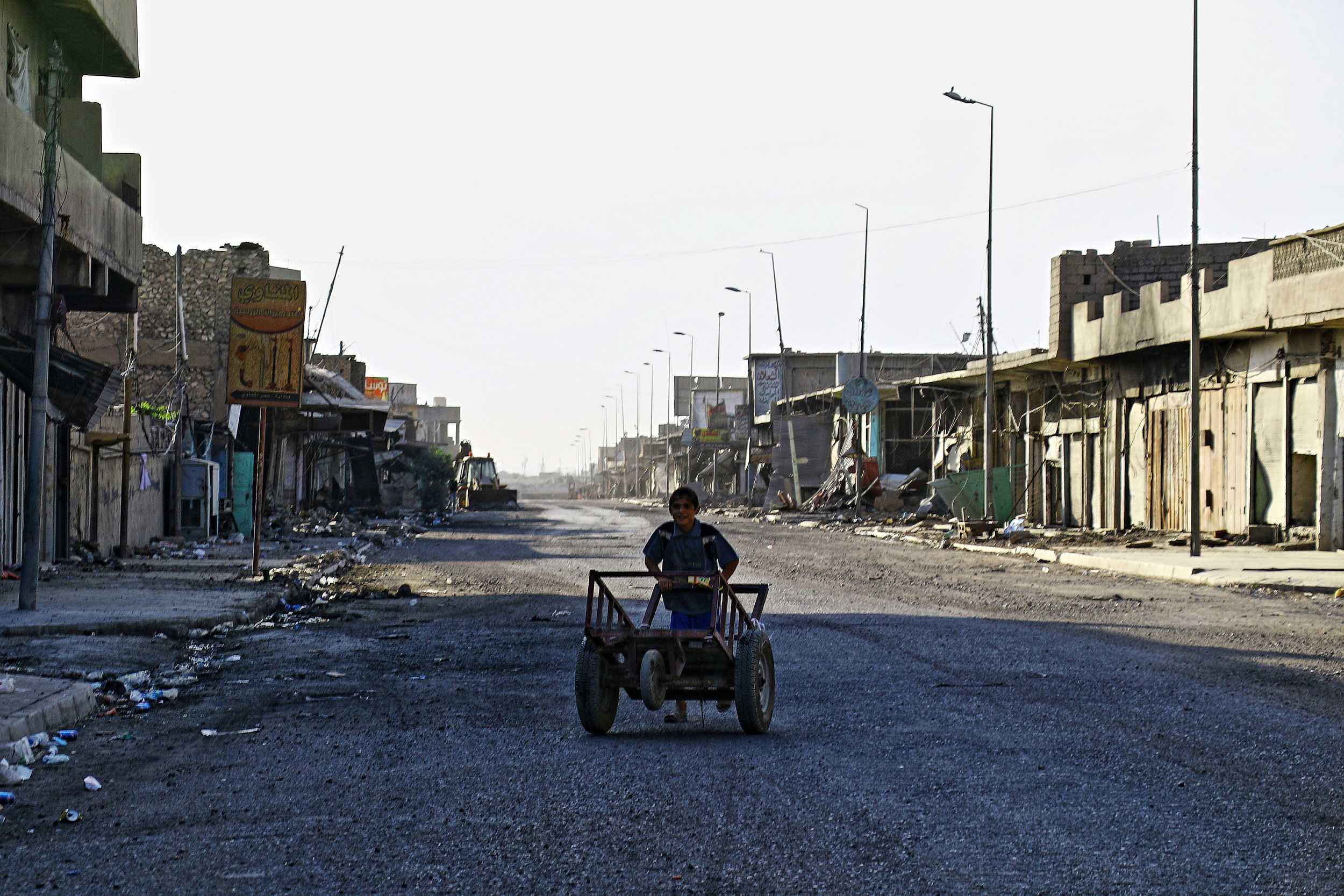The “liberation” of Mosul could play a significant role in defeating ISIL in Iraq, as the city was the last major stronghold of the terror group, which has faced a string of territorial losses this year both in Iraq and Syria.
Iraqi Prime Minister Haider al-Abadi has celebrated the victory over ISIL in the country’s second largest city, after nine months of fierce fighting by Iraqi security forces to dislodge militants.
"This is a great celebration that crowned the victories of the fighters and the Iraqis over the last three years," al-Abadi said on Monday, as Iraqi forces hoisted the national flag on the banks of the Tigris River in Mosul's Old City, although in one small pocket of the city the fighting is still underway.

Iraqi Prime Minister Haider al-Abadi announces victory over ISIL in Mosul, Iraq July 10, 2017. /VCG Photo
‘Historic’ victory
Located along the banks of the Tigris River in northern Nineveh province, Mosul is Iraq's second-largest city, with more than two million residents before the fighting began.
Recapturing this strategic town will have a significant impact on ISIL operations, as the city – close to the borders with Syria and Turkey – serves as a “link” for the movement of ISIL fighters, weapons, and supplies.
The city is close to significant oilfields in northern Iraq and a major oil pipeline into Turkey, so retaking the city will heavily hit ISIL’s finances as the militant group has illegally sold oil to fund its terrorist operations.

Iraq's federal police members wave Iraq's victory signs as they celebrate in the Old City of Mosul on July 10, 2017 after the government's announcement of the "liberation" of the embattled city. /VCG Photo
ISIL captured nearly 40 percent of Iraqi territory in 2014, but this now drops to 6.7 percent after three years of battling the US-led coalition and Iraqi army. For the later, retaking Iraq’s second-largest city will certainly help boost confidence in defeating the ISIL.
The former US Defense Secretary Ash Carter said victory in Mosul would be a “decisive moment” in a campaign to defeat ISIL, as losing Mosul means the terror group has lost a very significant urban base.
Destroy the center of power
ISIL gained control of the city in June 2014, and its leader Abu Bakr al-Baghdadi declared himself "caliph," a spiritual leader of Islam, claiming succession from Muhammad, in a rare public appearance at a mosque.
With this declaration ISIL burst onto the world stage.

Abu Bakr al-Baghdadi making what would have been his first public appearance, at a mosque in the centre of Iraq's second city, Mosul, according to a video recording posted on the Internet on July 5, 2014. /VCG Photo
Baghdadi’s announcement to establish a “caliphate,” comprising several existing countries, was the first attempt by a terror group in modern times to control its state. The idea of a “caliphate” has also been an essential ISIL tool to recruit young fighters for its war.
Fawaz Gerges, the author of "ISIS: A History," said in his book that Mosul had been considered the "cultural capital" since Baghdadi's declaration there.
ISIL made Mosul its de facto political and military center, though it set Syria’s northern city of Raqqa as its capital. Most of the senior leaders reportedly resided in Mosul, and this was where major decisions were made.
‘Far from over’

Members of the Iraqi forces celebrate in the Old City of Mosul on July 10, 2017 after the government's announcement of the "liberation" of the embattled city from ISIL group fighters. /VCG Photo
Despite a "historic" victory in Mosul, the top US commander in Iraq, Lt Gen Stephen Townsend, warned that the war against the ISIL is not over, as ISIL fighters are still in Iraq.
"If we're to keep ... ISIL 2.0 from emerging, the Iraqi government is going to have to do something pretty significantly different," Townsend said, adding that the Iraqi government should now reach out to Iraq's Sunnis, where ISIL has cultivated deep roots, to stop the jihadist group emerging as ISIL 2.0.
Meanwhile, the victory in Mosul has not removed all extremists and jihadists from the city.
Speaking to Al Jazeera, Feisal Istrabadi, former Iraqi ambassador to the UN, voiced similar concerns.
"We've already seen ISIL engaging in a campaign of terror in Baghdad and other places, so I think its immediate future is that it runs as a classical terrorist organization pulling off terrorism acts until the state of Iraq is able to adequately deal with it or snuff it out altogether," he said.

An Iraqi boy walks between destroyed buildings in Mosul after the city was declared free from ISIL, in Mosul, Iraq on July 10, 2017. /VCG Photo
Now only one million people remained in the city of Mosul, and the city's infrastructure has also been hard hit, with six western districts almost destroyed and initial repairs expected to cost more than one billion US dollars, the United Nations has said.
ISIL’s influence is waning but observers have warned its ability to exploit simmering ethnic and sectarian hatred will still exist, like Michael Knights and Alexander Mello warned in a recent articles in Combating Terrorism Center at the United States Military Academy at West Point that Diyala, Iraq’s sectarian tinderbox might be the group’s next target as it designed to plunge the country deeper into civil war.
Related story:










